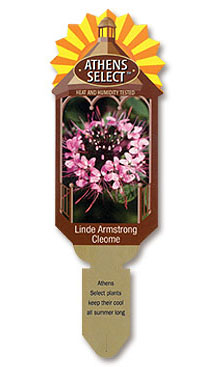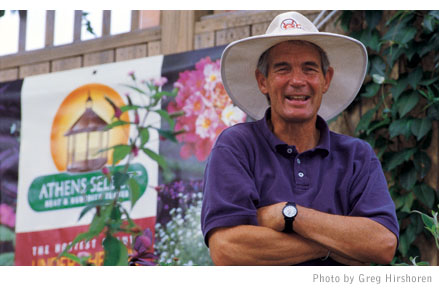


Research Blooms in the Garden
by Jamie Palmer & Nicholas Porter
Part I | Part II | A Sampling From the Garden


A
series of ‘Sunlover’ coleus is among the many ornamental plants Allan
Armitage has introduced to the garden trade through the University of
Georgia Trial Gardens.

Part I
The moment Allan Armitage spotted the delicate, white, plume-like flowers and cut-leaf foliage he knew it could be a winner for American gardens.
What the University of Georgia horticulture professor didn’t know was how much trouble this first cousin of the rose would cause on its journey to commercial production.
For starters, he had only three live specimens. Worse, they were hybrids of two wild plants, one native to the colder Midwest and the other to Korea.
He transplanted
the perennials from their home in a Maryland garden to the UGA Trial Gardens'
loamy soil and watched to see what happened.

At the UGA Trial Gardens, horticulture professor Allan Armitage cultivates
new plants for garden landscapes. Popular selections in the New Crop Program
include the verbena 'Homestead Purple,' the lantana 'Athens Rose' and
the rosemary 'Athens Blue Spires.'
Two died. But one thrived.
“This darn thing was flowering in Athens, Georgia. It’s supposed to die,” Armitage said.
A couple years later, the plant — which looks nothing like a rose — was still thriving. But it hadn’t produced a single seedling. And it didn’t lend itself to propagation from cuttings.
“I’m saying to myself, ‘Good grief, this is a good plant. But I’ve only got one plant. One plant in the whole world. And what am I going to do with this?’” he said.
Through his research at the UGA Trial Gardens, Armitage has introduced gardeners to dozens of popular landscape ornamentals: ‘Homestead Purple’ verbena, the chartreuse sweet potato vine ‘Margarita’ and a series of coleus that thrive in the sun, to name a few.
To propagate this stubborn hybrid perennial, he enlisted help from Hazel Wetzstein, a fellow UGA horticulture professor, whose office is just down the hall. Wetzstein specializes in biotechnology and is familiar with the use of tissue culture to propagate plants.
Deciding his only option was to divide the plant in two, he gave Wetzstein one part and planted the other back in the trial gardens.
His half died.
All his hopes now rested on Wetzstein’s ability to nudge her sample to produce viable plants through tissue culture.
“She went through all kinds of conniptions and she finally got these things growing in test tubes,” he said. “She was a savior.”
From the test tubes they were transplanted to small containers and then eventually made their way into the trial gardens — this time as an official entry in Armitage’s plant trials — and were subjected to the rigorous evaluation of all plants that bear his stamp of approval. During the next few years, the feisty perennial aced all the tests, first in Georgia and then in Minnesota, Maine, Illinois and North Carolina.
“You are going to start seeing this plant everywhere by 2004, I hope, and it’s going to be called Aruncus ‘Misty Lace,’” said Armitage, who has submitted a patent on the new perennial.
“Why this garden continues to be successful is that we try to stay ahead of the curve. In ornamental horticulture — particularly the material I work with, perennials and annuals — the need, the desire for something new, is infinite. The industry doesn’t want to wait 10 years for it,” said Armitage, an All-America Selections Trial Gardens judge.
Armitage never knows where he’ll discover the next hot garden trendsetter.
For instance, he and Michael Dirr, also a UGA horticulture professor, spotted what later became ‘Homestead Purple’ verbena — and a national top-seller — on a routine drive to Atlanta. At 60 miles per hour, it was just a flash of color, but enough to trigger an instant reflex in serious scientists. They wheeled the car around and turned into the driveway of a modest rural home.
“This lady came to the door in her housecoat,” Armitage recalled, “and we asked if we could look at her flowers. She looked at us like we were two numbskulls.”
Once over the initial shock, she led them to a patch of verbena, a hearty, all-but-forgotten plant with vibrant, stirring flowers.
“She was just in her glory. I think it was the first time anybody had ever noticed her flowers,” he said.
It certainly wasn’t the last. Armitage and Dirr returned to the university that day with seven verbena cuttings for the trial gardens.
Their impromptu visit resulted in the first plant ever introduced by the UGA Trial Gardens, which Armitage founded in 1983. ‘Homestead Purple’ became the No. 1 selling verbena in America and helped launch Armitage on a quest for new varieties of ornamental plants with the potential for success in the floriculture industry.
It also focused widespread attention on the trial gardens and the university’s New Crop Program, a related endeavor in which Armitage seeks out colorful ornamental plants that withstand heat and humidity and resist disease.
“I’m not a plant breeder. I’m a plant selector,” he said. “Most of these plants are ones that I just happened to notice, then did a little selection to make them better plants for this area.”
Another gem came from a private gardener in Raleigh, N.C., who heard Armitage talk about the little-known virtues of a dark-leaved sweet potato already on the market.
“Most people thought I was rather addled to actually be talking about an ornamental sweet potato,” Armitage said. “However, the young man asked me if I would like to try a chartreuse-leaf form.”
Armitage put it through his rigorous trial program, eventually introducing it to the industry as ‘Margarita.’
“We’ve had a lot of successes, but that sweet potato may be the most unusual. I can’t go anywhere that I don’t see that thing — and it all resulted from a story about a crazy vegetable,” he said.
Part I | Part II | A Sampling From the Garden
For comments or for information please e-mail the editor: jbp@ovpr.uga.edu
To contact the webmaster please email: ovprweb@uga.edu
![]()